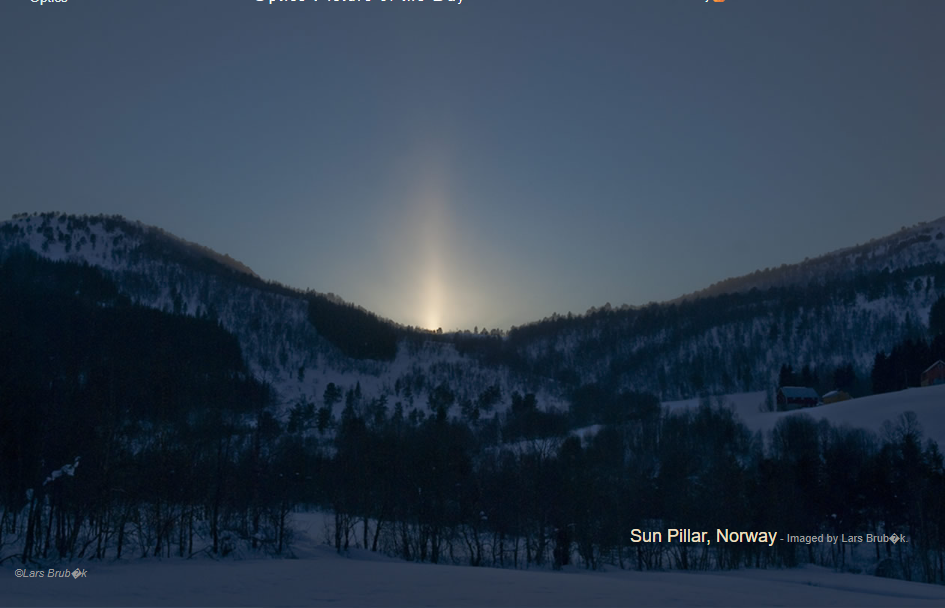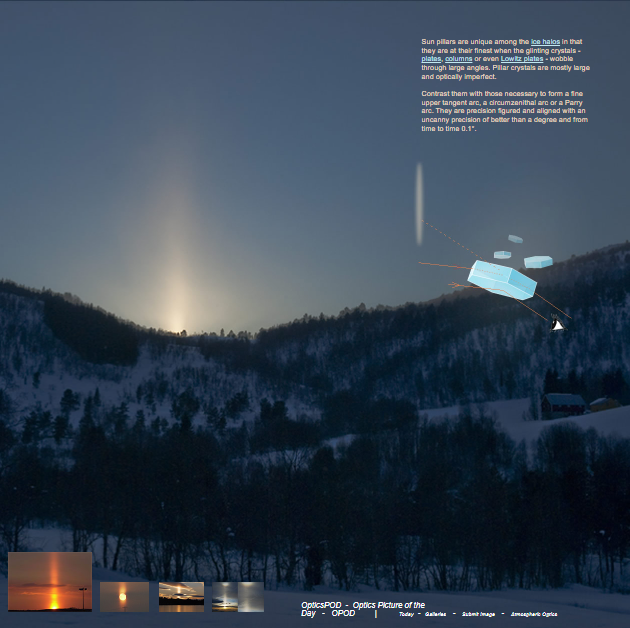OPOD - Sun Pillar, Norway
OPOD - Sun Pillar, Norway: A Stunning Atmospheric Phenomenon
Have you ever witnessed a breathtaking optical display in the sky? One such mesmerizing phenomenon is the Sun Pillar, a captivating vertical beam of light that appears to extend upwards from the sun. In this article, we will delve deeper into the enchanting world of Sun Pillars, with a focus on an awe-inspiring example captured in Norway.
The Marvelous Sun Pillar
Sun pillars are a unique type of ice halo that manifests itself when glimmering ice crystals, such as plates, columns, or Lowitz plates, wobble at large angles. Unlike other halos that require precision alignment and optical perfection, pillar crystals are mostly large and optically imperfect. This imperfection contributes to the distinct appearance of the Sun Pillar.
The Beauty of Sun Pillars in Norway
Norway, with its icy landscapes and frequent cold temperatures, provides an ideal setting for witnessing extraordinary atmospheric phenomena. One such instance was captured by Lars Brubæk, who managed to photograph a stunning Sun Pillar in all its glory. The image showcases the pillar extending upwards from the sun, casting an ethereal glow across the sky.
Precision and Imperfection
Contrasting with other halos like the upper tangent arc, circumzenithal arc, or Parry arc, which require precise alignment and optical perfection, Sun Pillars possess a certain rugged beauty. The crystals forming the pillar are relatively large and lack the meticulous alignment found in other halo formations. This imperfection gives Sun Pillars their unique character and adds to their allure.
A Play of Light and Ice Crystals
To understand the formation of a Sun Pillar, we must examine the interaction between sunlight and ice crystals suspended in the atmosphere. As sunlight passes through these ice crystals, it is refracted and reflected, creating a myriad of optical effects. In the case of a Sun Pillar, the light is reflected off the flat surfaces of the ice crystals, resulting in a vertical beam of light that appears to emanate from the sun.
The Role of Wobbling Crystals
One fascinating aspect of Sun Pillars is the wobbling motion of the ice crystals. As these crystals float in the air, they can rotate or tilt, causing the pillar to shimmer and dance in the sky. The larger size and imperfections of the crystals contribute to this wobbling effect, creating a dynamic and ever-changing display of light.
The Magic of Norway's Sun Pillar
Norway's Sun Pillar, captured by Lars Brubæk, showcases the immense beauty and wonder of this atmospheric phenomenon. The photograph reveals the pillar stretching upwards, surrounded by a backdrop of icy landscapes. The interplay between the sun's rays and the wobbling ice crystals creates a truly magical spectacle, leaving viewers in awe of nature's artistic prowess.
Capturing the Moment
Photographing a Sun Pillar can be a challenging task, requiring patience, timing, and a keen eye for atmospheric conditions. To capture the perfect shot, one must be prepared to venture into cold environments and wait for the opportune moment when the sun's position and crystal alignment align harmoniously. Lars Brubæk's remarkable photograph is a testament to his dedication and skill as a photographer.
Appreciating Atmospheric Optics
The world of atmospheric optics is a fascinating realm where light and nature intertwine to create mesmerizing displays. Sun Pillars, with their towering presence and shimmering allure, serve as a reminder of the beauty that lies beyond our reach. By exploring and appreciating these natural phenomena, we gain a deeper understanding of the intricate workings of our atmosphere and the wonders it has to offer.
Embracing Nature's Spectacle
In conclusion, Sun Pillars are a captivating atmospheric phenomenon that leaves spectators spellbound. Norway's Sun Pillar, as captured by Lars Brubæk, showcases the grandeur and splendor of this optical display. With its towering beam of light and wobbling ice crystals, the Sun Pillar serves as a testament to the beauty and complexity of our natural world. So, next time you find yourself beneath a clear, cold sky, take a moment to look up and immerse yourself in the enchanting spectacle of a Sun Pillar.

Sun Pillar, Norway - Imaged by Lars Brub�k.

Sun pillars are unique among the ice halos in that they are at their finest when the glinting crystals - plates, columns or even Lowitz plates - wobble through large angles. Pillar crystals are mostly large and optically imperfect.
Contrast them with those necessary to form a fine upper tangent arc, a circumzenithal arc or a Parry arc. They are precision figured and aligned with an uncanny precision of better than a degree and from time to time 0.1°.
Note: this article has been automatically converted from the old site and may not appear as intended. You can find the original article here.
Reference Atmospheric Optics
If you use any of the definitions, information, or data presented on Atmospheric Optics, please copy the link or reference below to properly credit us as the reference source. Thank you!
-
<a href="https://atoptics.co.uk/blog/opod-sun-pillar-norway/">OPOD - Sun Pillar, Norway</a>
-
"OPOD - Sun Pillar, Norway". Atmospheric Optics. Accessed on November 26, 2024. https://atoptics.co.uk/blog/opod-sun-pillar-norway/.
-
"OPOD - Sun Pillar, Norway". Atmospheric Optics, https://atoptics.co.uk/blog/opod-sun-pillar-norway/. Accessed 26 November, 2024
-
OPOD - Sun Pillar, Norway. Atmospheric Optics. Retrieved from https://atoptics.co.uk/blog/opod-sun-pillar-norway/.